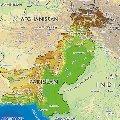Pakistani ground troops moved out of their bases in and around South Waziristan Saturday, hours after top military and political leaders met in the capital, Islamabad.
Pakistan has experienced a wave of terror attacks, including suicide blasts targeting international and security organizations, coordinated attacks around the country's cultural center, Lahore, and an audacious assault on the army's headquarters near Islamabad. Some 175 people have died in the past two weeks. The government has blamed the Pakistani Taliban, which is based in South Waziristan, for the violence.
Hours ahead of Saturday's offensive, Pakistani authorities imposed a curfew and turned off mobile phone service in some areas. Army officials say nearly 30,000 troops have been deployed to take on an estimated 10,000 Taliban fighters. In recent days, the military has launched several air and artillery strikes on suspected militant positions.
Despite the military's superiority in numbers, former security chief of the tribal regions, Mahmood Shah, tells VOA it will not be an easy battle. "This 30,000 against 10,000 is a conventional battle," he said. "The militants do not fight conventional battles." He says he expects the military will face an enemy deeply entrenched in the mountainous and remote region. He also cautions that militants will likely launch suicide attacks elsewhere.
This is not the first time the military has done an offensive in the tribal region. But those previous operations were not successful mainly because militants killed sympathetic tribal leaders and opposition political parties refused to offer their support.
For the past several months since the anti-Taliban offensive in and around Swat Valley, the military has built up its forces around South Waziristan.
Manuel Bessler, head of the U.N. 's Office for Coordinating Humanitarian Affairs in Pakistan, tells VOA that many civilians have fled the area. "We had IDPs, internally displaced people, since May about 77,000, up to 80,000," he said. "Now with this more intense fighting and military operation inside [South] Waziristan, we have a daily outflow of 70 to 100 families from the area." And with the harsh winter weather just weeks away, Bessler says his office is coordinating closely with Pakistani agencies to help those displaced.
Sean Maroney, VOA news, Islamabad

